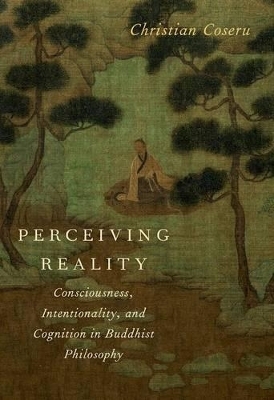
Perceiving Reality
Oxford University Press Inc (Verlag)
978-0-19-025311-0 (ISBN)
What turns the continuous flow of experience into perceptually distinct objects? Can our verbal descriptions unambiguously capture what it is like to see, hear, or feel? How might we reason about the testimony that perception alone discloses? Christian Coseru proposes a rigorous and highly original way to answer these questions by developing a framework for understanding perception as a mode of apprehension that is intentionally constituted, pragmatically oriented, and causally effective. By engaging with recent discussions in phenomenology and analytic philosophy of mind, but also by drawing on the work of Husserl and Merleau-Ponty, Coseru offers a sustained argument that Buddhist philosophers, in particular those who follow the tradition of inquiry initiated by Dign?ga and Dharmak?rti, have much to offer when it comes to explaining why epistemological disputes about the evidential role of perceptual experience cannot satisfactorily be resolved without taking into account the structure of our cognitive awareness.
Perceiving Reality examines the function of perception and its relation to attention, language, and discursive thought, and provides new ways of conceptualizing the Buddhist defense of the reflexivity thesis of consciousness-namely, that each cognitive event is to be understood as involving a pre-reflective implicit awareness of its own occurrence. Coseru advances an innovative approach to Buddhist philosophy of mind in the form of phenomenological naturalism, and moves beyond comparative approaches to philosophy by emphasizing the continuity of concerns between Buddhist and Western philosophical accounts of the nature of perceptual content and the character of perceptual consciousness.
Christian Coseru is Associate Professor of Philosophy in the Department of Philosophy at the College of Charleston
Contents ; Abbreviations ; Acknowledgments ; 1. Introduction: Taking the Structure of Awareness Seriously ; 2. Naturalizing Buddhist Epistemology ; 2.1. Doctrine and Argument ; 2.2. Reason and Conceptual Analysis ; 2.3. Interpretation and Discourse Analysis ; 2.4. Cognition as Enactive Transformation ; 2.5. Logic and the Subjectivity of Thought ; 2.6. Phenomenological Epistemology and the Project of Naturalism ; 3. Sensation and the Empirical Consciousness ; 3.1. No-self and the Domains of Experience ; 3.2. Two Dimensions of Mind: Consciousness as Discernment and Sentience ; 3.3. Attention and Mental Proliferation ; 3.4. Cognitive Awareness and Its Object ; 4. Perception, Conception, and Language ; 4.1. Shared Notions about Perceptual Knowledge ; 4.2. Debating the Criteria for Reliable Cognition ; 4.3. Cognitive Aspects and Linguistic Conventions ; 4.4. Epistemology as Cognitive Event Theory ; 5. An Encyclopedic and Compassionate Setting for Buddhist Epistemology ; 5.1. Dependent Arising and Compassion ; 5.2. Mapping the Ontological and Epistemological Domains ; 5.3. Perception and the Principle of Clarity ; 6. Perception as an Epistemic Modality ; 6.1. The Conditions for Perceptual Knowledge ; 6.2. Perception, Conception, and the Problem of Naming ; 6.3. Phenomenal Content, Phenomenal Character, and the Problem of Reference ; 6.4. Cognitive Errors and Perceptual Illusions ; 7. Foundationalism and the Phenomenology of Perception ; 7.1. Intrinsic Ascertainment and the "Given" ; 7.2. Particulars and Phenomenal Objects ; 7.3. Foundationalism and Its Malcontents ; 7.4. Naturalism and Its Discontents ; 7.5. Beyond Representation: An Enactive Perception Theory ; 8. Perception, Self-Awareness, and Intentionality ; 8.1. Reflexivity and the Aspectual Nature of Intentional Reference ; 8.2. Phenomenal Objects and the Cognitive Subconscious ; 8.3. The Intentional Structure of Awareness ; 8.4. An Epistemological Conundrum: Explaining the Subject-Object Relation ; 9. In Defense of Epistemological Optimism ; 9.1. A Moving Horizon ; 9.2. Embodied Consciousness: Beyond "Seeing" and "Seeing As" ; 9.3. Epistemic Authority Without Manifest Truth ; Bibliography
| Verlagsort | New York |
|---|---|
| Sprache | englisch |
| Maße | 163 x 241 mm |
| Gewicht | 680 g |
| Themenwelt | Geisteswissenschaften ► Philosophie ► Erkenntnistheorie / Wissenschaftstheorie |
| Geisteswissenschaften ► Philosophie ► Östliche Philosophie | |
| Geisteswissenschaften ► Religion / Theologie ► Buddhismus | |
| ISBN-10 | 0-19-025311-8 / 0190253118 |
| ISBN-13 | 978-0-19-025311-0 / 9780190253110 |
| Zustand | Neuware |
| Haben Sie eine Frage zum Produkt? |
aus dem Bereich

![Was heißt Denken?. Vorlesung Wintersemester 1951/52. [Was bedeutet das alles?] - Martin Heidegger](/media/113619842)
